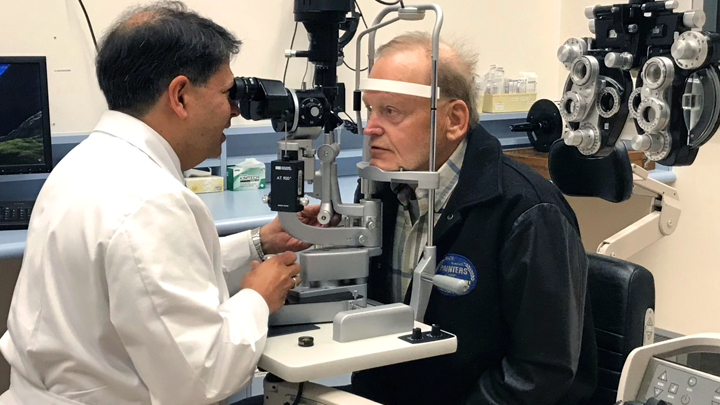
July 20, 2020

Dr. Karim Damji checks Donald Bourque’s vision. A routine eye exam helped Bourque discover he had glaucoma. In 2017, he received a combined cataract and glaucoma surgery to enhance his vision. Glaucoma affects one to two per cent of the population, with many unaware they even have it until vision loss is advanced.
Story by Vanessa Gomez | Photo by Sharman Hnatiuk
Glaucoma is a leading cause of blindness in Canada — affecting one to two per cent of the population — with many unaware they even have it.
Glaucoma is the name for a group of eye diseases which damage the optic nerve. It has several causes, including increased pressure in the eye.
“In Alberta, open-angle glaucoma is one of the most common types,” says Dr. Karim Damji, Clinical Section Head for Ophthalmology in Alberta Health Services’ Edmonton Zone. “But there are often no symptoms until the late stages when vision loss is advanced.”
According to the Canadian National Institute for the Blind, it’s common for individuals over the age of 40 to develop glaucoma, with the risk increasing significantly after the age of 60.
Like many, Donald Bourque was unaware of his glaucoma until a routine eye exam. In 2017, Bourque received a combined cataract and glaucoma surgery to help enhance his vision. Today, Bourque takes eye-pressure medication to manage his glaucoma — as there is no cure — but he says he’s grateful for the excellent care he received from Dr. Damji and the Eye Institute of Alberta at the Royal Alexandra Hospital.
Glaucoma research and awareness is growing with a closer look into the genetics of the disease and clinical trials involving new ways of doing surgery with lower impact to patients. A team of vision scientists at the University of Alberta, together with their international collaborators, have become the first in the world to discover a gene responsible for pigmentary glaucoma.
“We’re lucky to be able to leverage the technology we have with an excellent team in the clinic and in the operating room to provide the best patient care,” adds Dr. Damji.
Bourque encourages other Albertans to take care of themselves and have their eyes checked regularly, so they can preserve their vision like he has.